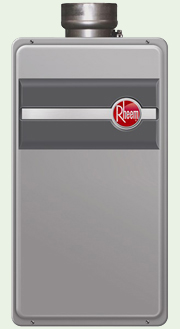Tankless Water Heater
Tankless Water Heaters:
Reduce Waste – Purchasing durable, long lasting products is a means of waste prevention. It is estimated that 7.3 million traditional tank-based water heaters are disposed into landfills each year in the United States.
Use Less Energy – By eliminating stand-by heat loss alone, energy consumption can be reduced significantly. If every tank heater was replaced with a high-efficiency tankless water heater, North American society alone could annually save:
- 290 million gallons of fuel oil
- 164 million gallons of propane
- 6 billion hours of kilowatt electricity
- Reduce Global Warming – By reducing the amount of CO2 emitted into the atmosphere we can reduce the effects of Global warming significantly. A tankless water heater is 83%-93% efficient so it can reduce about 700-1,000 lbs. of CO2 per year compared to a tank water heater.
How It Works — Whole-Home Gas Tankless Water Heaters
Whole-home gas tankless water heaters apply the same principle to heat water as standard gas water heaters, but without a storage tank. They save energy by heating water only when needed, eliminating energy lost during standby operation.
Here's how:
When a hot water tap is turned on in the home, cold water is drawn into the water heater. A flow sensor activates the gas burner, which warms the heat exchanger. Incoming cold water encircles the heat exchanger and leaves the heater at its set-point temperature. Combustion gases safely exit through a dedicated, sealed vent system.
By heating water only when needed, instead of maintaining a tank full of hot water at all times, tankless water heaters can achieve greater efficiency than standard tank-type water heaters.
Advantages:
- Energy is not used until a demand is present.
- Smaller footprint than tank-type water heaters, saves floorspace.
- Unlimited hot water supply, as long as fuel is present (electric/gas).
- No risk of a broken or ruptured tank, which could lead to flood damage.



